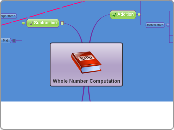par Whitney Steg Il y a 15 années
1705
Whole Number Computation

par Whitney Steg Il y a 15 années
1705

Plus de détails
Steps to perform
If the problem is- 5/330
• Ask “5 times what tens number gives an answer
closest to 330 without going over?”
• 5 x 60 = 300 but 5 x 70 = 350, so 60 gives us
the answer closest to 300 without going over.
• Draw a second rectangle section to the right of
the first section.
• Write a plus sign after the 60 between the two
sections.
• Write 30, the difference from the first
section, inside the second section.
• Ask, “5 times what number gives an answer
closest to 30 without going over?”
• 5 x 6 = 30
• Write 6 at the top of the second section.
• Multiply 5 by 6 to get 30.
• Write 30 below the existing 30.
• Subtract 30 from 30 to get 0.
• Write the difference, 0, below the second
rectangle.
• Add the quotients from each section to find
the quotient: 60 + 6 = 66.
• So, 330 ÷ 5 = 66.
60 + 6 = 66
Let a and b be whole numbers. The difference of a and b, written a - b, is the unique whole number c such that a = b + c
Lets play a quick game!
The children stand at the back of the class and answer differentiated multiplication questions. They sit down when they have answered a question correctly. The last person standing has to do a forfeit. Forfeits can include being the teacher's slave for the morning, tidying the classroom or anything silly.
Ful of fun
Just like doing it by hand, now do it mentally!
The rule states: "If you add the same number to both numbers in the problem, the answer is the same. Likewise, If you subtract the same number from both numbers in the problem, the answer is the same." Using this rule makes the problem more user friendly by changing the second number in the problem to a number with a zero in the ones place.
Example
12 - 8 = 4
Add 4 to both the 12 and the 8.
(12 + 4) - (8 + 4) = 16 - 12 = 4
12 - 8 = ?
Or subtract 6 from both the 12 and the 8. By subtracting 6 from both
numbers you simplify both number and can subtract without regrouping.
(12 - 6) - (8 - 6) = 6 - 2 = 4
How to perform method
Let a and b be any thwo whole numbers. Then the product of a and b, written a x b, is defined by
a x b = b+b+b+.........+b, when a is not equale to 0
Easy and fun!
Basically, it is a competition between the children and teacher. The teacher ask quite hard Maths questions. If the children get the answer right, they get one point. If they get it wrong, the teacher gets a point. The first to score 5 points gets a permanent point on a scoreboard.
The Egyptian Method of multiplication is a three-stage process. In the first stage one forms two columns, one for each factor. The entries in both columns are formed by repeated doubling. The first column starts with a 1, and doubling is done until one reaches the largest power of two not exceeding the first factor. The second column starts with the second factor, and repeatedly doubles as often as was done in the first column. In the second stage, working bottom to top, one identifies the subset of entries in the first column that adds up to the first factor, and one crosses out the other entries. In the third stage one adds up the corresponding entries in the second column. The example blow assumes that the addition is done using the fast traditional algorithm with carries done mentally.
83 * 27
+ 1 27
+ 2 54
4 108
8 216
+ 16 432
32 864
+ 64 1728
-- ----
83 2241
The Rules
Example Problem
83
27
----
80*20 -> 1600
80* 7 -> 560
3*20 -> 60
3* 7 -> 21
----
2241
Reformulate a sum to one that is more readily obtained mentally.
Example 23 + 67
Think: 23 + 67
-3 +3
20 + 70 = 90
Create numbers that give you a sum that is easy to use in your head.
Example 45 + 57
Think: 45 and 55 are considered compatible because they add to 100 which is an easy number to work with, so: 45 + 57 =
45 + (55+2) =
100 + 2 = 102
Break up the numbers after the first addend. Add the parts, bridging from one number to the next.
Example 742 + 148
Think: 742 + 100 = 842
842 + 40 = 882
882 + 8 = 890
Load of fun
Add the numbers beginning with the left most digits and move to the right.
Example 724 + 543
Think: 700 + 500 = 1200
20 + 40 = 60
4 +3 = 7
Then 1200 + 60 + 7 = 1267
Practice
Definition
Concept
This concept is the same as same change for subtraction only you are doing the opposite change. This means if you add four to one number you will subtract four from the other number.
How to perform